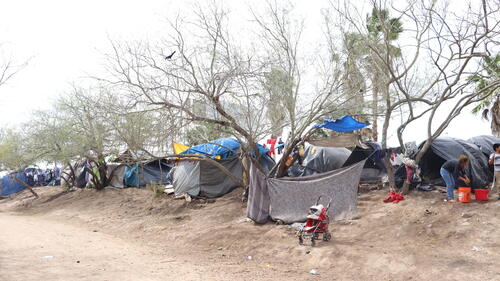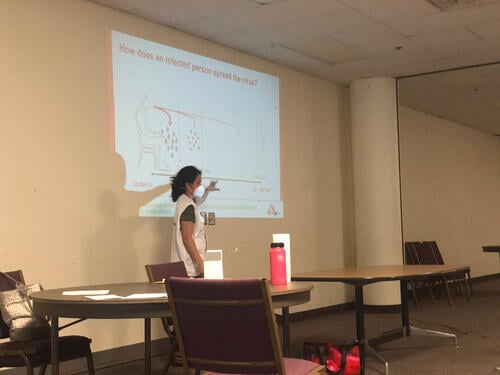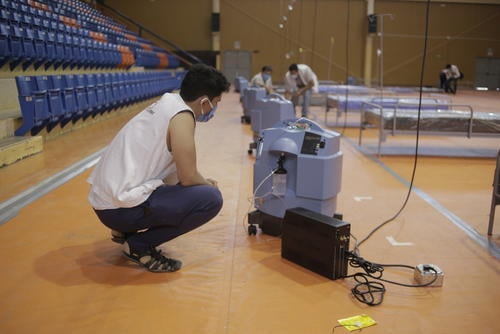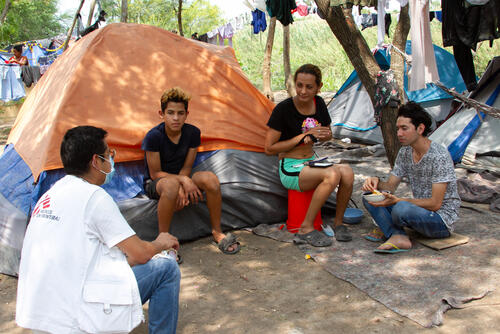- Asylum seekers from Central America have been forcibly returned from the US to Mexico, under the justification of stopping the spread of the coronavirus outbreak.
- This forced return of people seeking safety threatens the health of thousands of people and goes against disease outbreak prevention measures.
- MSF urges the US and Mexican governments to ensure migrants and asylum seekers are included in pandemic mitigation measures and receive comprehensive medical care.
Mexico City/New York - The United States government’s decision to block asylum proceedings and close the US-Mexico border, with the justification to stem the spread of the coronavirus pandemic, threatens the health and safety of thousands of people seeking international protection in the United States who are then forced to return to Mexico, says Médecins Sans Frontières (MSF).
Since Saturday 21 March, MSF teams have witnessed the coerced transportation of Mexican and Central American migrants and asylum seekers returned from the United States to Matamoros, Mexico and onward to southern Mexico. We are alarmed by the systematic aspect of these measures, carried out without contingency or mitigation plans for the impact on public health and humanitarian needs.
“Using COVID-19 as an argument to evade their international obligations towards refugees and migrants is not only unacceptable, but also counterproductive in terms of outbreak control,” says Dr Isabel Beltrán, medical coordinator for MSF in Mexico and Central America. “These types of measures are unnecessary and disproportionate because they discriminate and stigmatise against one segment of the population and prevent people feeling violence to have access to a system of protection and security.”
Using COVID-19 as an argument to evade their international obligations towards refugees and migrants is not only unacceptable, but also counterproductive in terms of outbreak control.Dr Isabel Beltrán, MSF medical coordinator
MSF has responded to countless outbreaks around the world, and we know that public health measures work when they protect everyone and fail when vulnerable populations like migrants are not included.
Additionally, as MSF has highlighted on several occasions, US migration policies implemented by Mexico, such as the so-called Migrant Protection Protocol (MPP), jeopardise the lives of those forced to await the processing of their asylum claim in Mexico. These people find themselves trapped in a dangerous limbo, and their vulnerability increases with the expansion of the COVID-19 pandemic.
As the coronavirus continues to spread, we are monitoring the country’s health needs, while organising our response to maintain and scale up the comprehensive medical services being provided in Mexico. However, we are concerned with the impact that this pandemic will have in a context where people do not have regular access to medical services and are living in precarious conditions that enable the virus to spread.
“We have increased our medical activities in Matamoros due to the lack of comprehensive care inside the camp, where around 2,000 asylum seekers live,” said Dr Beltrán. “We are providing physical and mental health services, and health promotion activities. Despite these efforts, it is clear that it is impossible to properly implement infection prevention measures, such as disinfecting public spaces, frequent hand washing, and social distancing, in a place where entire families sleep together in a single tent.”
It is impossible to properly implement infection prevention measures, such as... social distancing, in a place where entire families sleep together in a single tent.Dr Isabel Beltrán, MSF medical coordinator
While MSF strengthens our response to the pandemic to reach vulnerable people, we stand in solidarity with people and urge the US and Mexican governments to take responsibility to ensure the inclusive provision of mitigation measures and comprehensive medical care, particularly to people living in hazardous conditions, such as migrants and asylum seekers.
“The biggest concern people have at the moment is the uncertainty about their futures,” said Marcelo Fernández, head of mission for MSF in Mexico. “They have no option other than sleeping in overcrowded spaces that do not allow for the prevention measures needed at this moment.”
“We are aware of the monumental challenges that come with the pandemic and, for that reason, it is necessary that medical groups coordinate actions that include these populations in their prevention plans and, if needed, containment measures,” said Fernández.






